NURS1013 Health Comms Essay: Reflection in Nursing Development
VerifiedAdded on 2022/09/09
|9
|2222
|16
Essay
AI Summary
This essay delves into the critical importance of reflective practices within nursing. It highlights how self-reflection and critical analysis of experiences, facilitated by tools like the Gibbs learning cycle, contribute significantly to a nurse's professional and personal development. The essay emphasizes the benefits of reflection in enhancing technical skills, improving patient care, especially for elder and critical patients, and fostering teamwork. It underscores the need for reflection in navigating the complexities of nursing, improving communication, and developing a deeper understanding of patient needs. The essay concludes that reflective practices are integral to continuous learning and the provision of efficient patient care services.
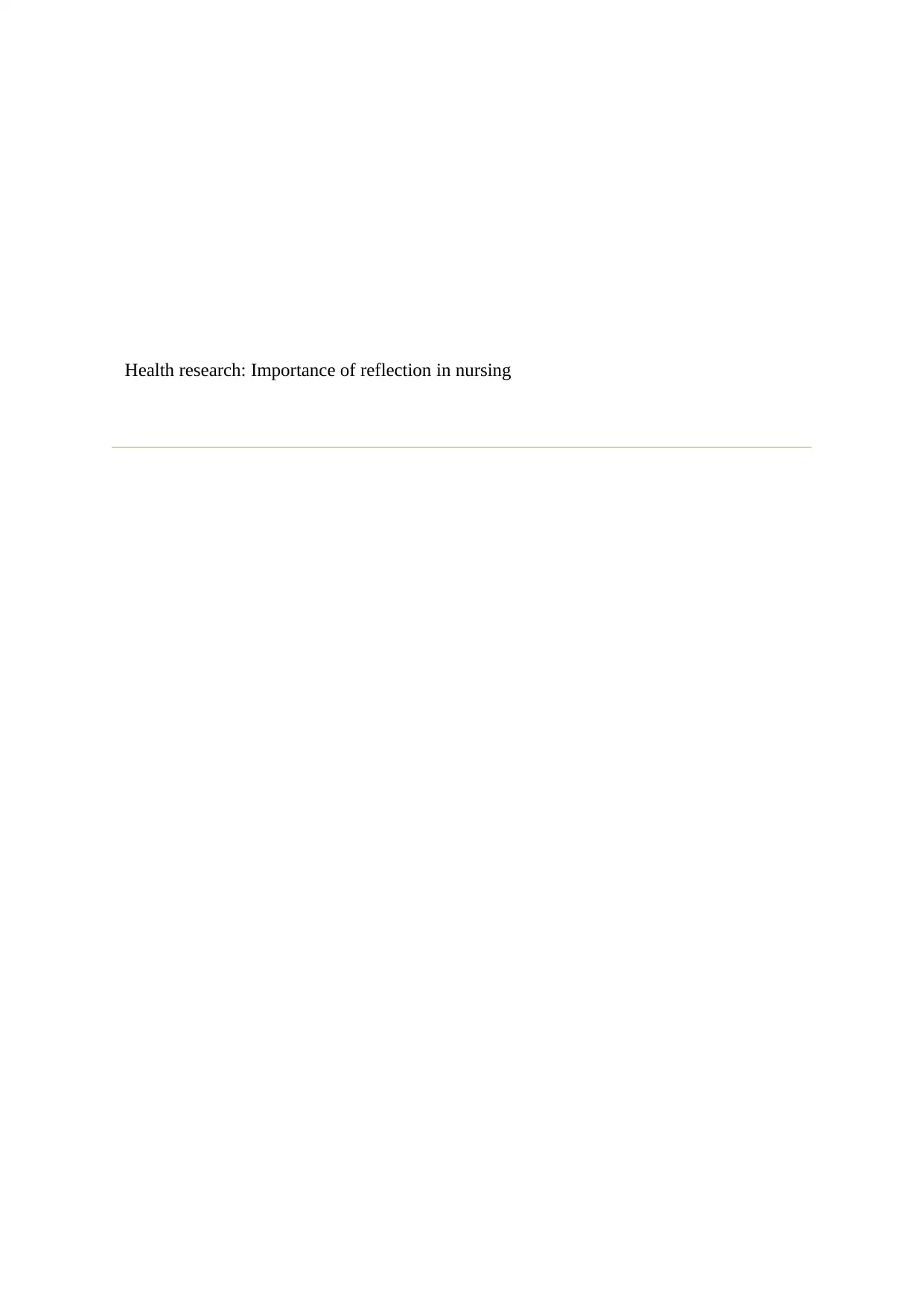
Health research: Importance of reflection in nursing
Paraphrase This Document
Need a fresh take? Get an instant paraphrase of this document with our AI Paraphraser
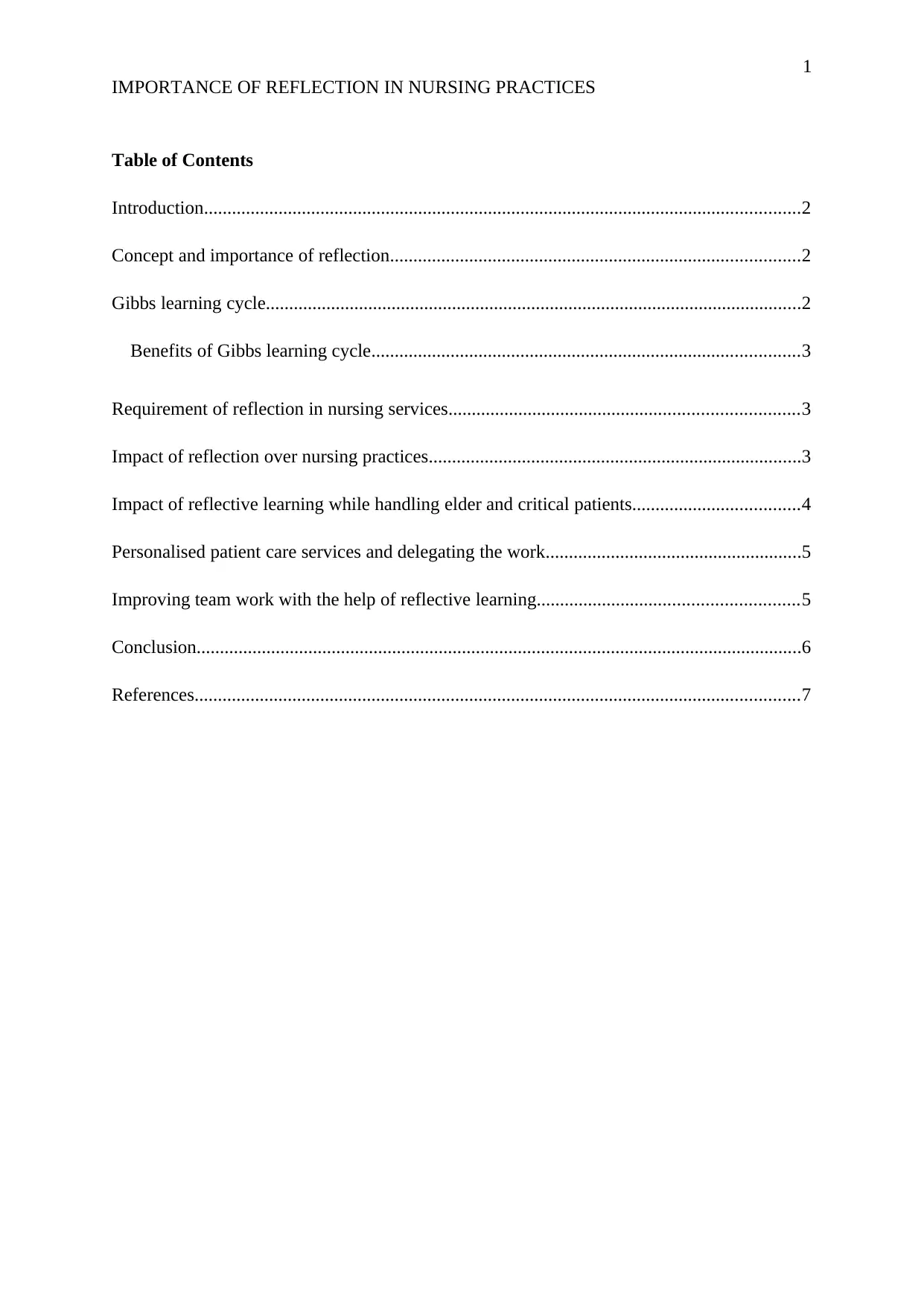
1
IMPORTANCE OF REFLECTION IN NURSING PRACTICES
Table of Contents
Introduction................................................................................................................................2
Concept and importance of reflection........................................................................................2
Gibbs learning cycle...................................................................................................................2
Benefits of Gibbs learning cycle............................................................................................3
Requirement of reflection in nursing services...........................................................................3
Impact of reflection over nursing practices................................................................................3
Impact of reflective learning while handling elder and critical patients....................................4
Personalised patient care services and delegating the work.......................................................5
Improving team work with the help of reflective learning........................................................5
Conclusion..................................................................................................................................6
References..................................................................................................................................7
IMPORTANCE OF REFLECTION IN NURSING PRACTICES
Table of Contents
Introduction................................................................................................................................2
Concept and importance of reflection........................................................................................2
Gibbs learning cycle...................................................................................................................2
Benefits of Gibbs learning cycle............................................................................................3
Requirement of reflection in nursing services...........................................................................3
Impact of reflection over nursing practices................................................................................3
Impact of reflective learning while handling elder and critical patients....................................4
Personalised patient care services and delegating the work.......................................................5
Improving team work with the help of reflective learning........................................................5
Conclusion..................................................................................................................................6
References..................................................................................................................................7
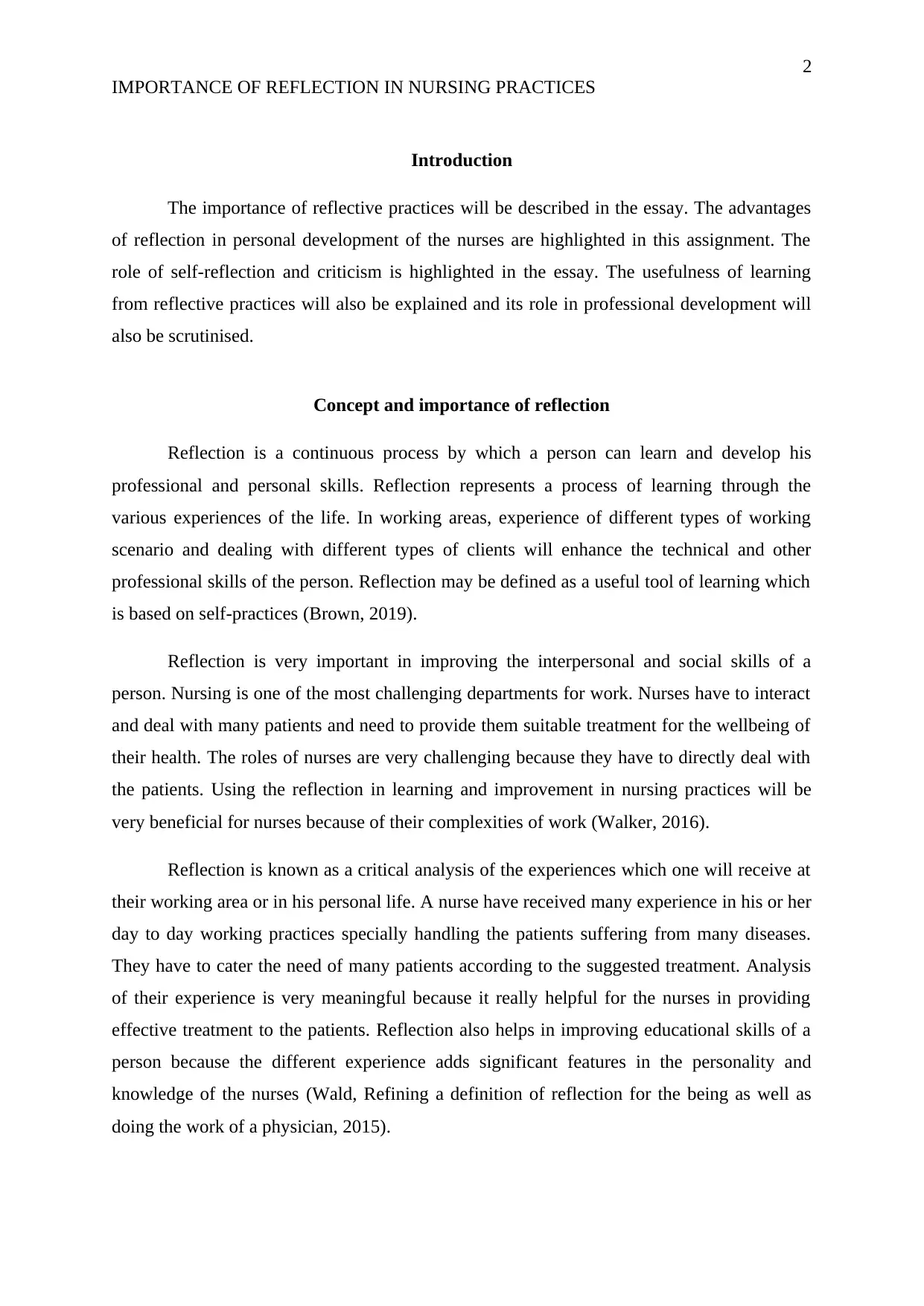
2
IMPORTANCE OF REFLECTION IN NURSING PRACTICES
Introduction
The importance of reflective practices will be described in the essay. The advantages
of reflection in personal development of the nurses are highlighted in this assignment. The
role of self-reflection and criticism is highlighted in the essay. The usefulness of learning
from reflective practices will also be explained and its role in professional development will
also be scrutinised.
Concept and importance of reflection
Reflection is a continuous process by which a person can learn and develop his
professional and personal skills. Reflection represents a process of learning through the
various experiences of the life. In working areas, experience of different types of working
scenario and dealing with different types of clients will enhance the technical and other
professional skills of the person. Reflection may be defined as a useful tool of learning which
is based on self-practices (Brown, 2019).
Reflection is very important in improving the interpersonal and social skills of a
person. Nursing is one of the most challenging departments for work. Nurses have to interact
and deal with many patients and need to provide them suitable treatment for the wellbeing of
their health. The roles of nurses are very challenging because they have to directly deal with
the patients. Using the reflection in learning and improvement in nursing practices will be
very beneficial for nurses because of their complexities of work (Walker, 2016).
Reflection is known as a critical analysis of the experiences which one will receive at
their working area or in his personal life. A nurse have received many experience in his or her
day to day working practices specially handling the patients suffering from many diseases.
They have to cater the need of many patients according to the suggested treatment. Analysis
of their experience is very meaningful because it really helpful for the nurses in providing
effective treatment to the patients. Reflection also helps in improving educational skills of a
person because the different experience adds significant features in the personality and
knowledge of the nurses (Wald, Refining a definition of reflection for the being as well as
doing the work of a physician, 2015).
IMPORTANCE OF REFLECTION IN NURSING PRACTICES
Introduction
The importance of reflective practices will be described in the essay. The advantages
of reflection in personal development of the nurses are highlighted in this assignment. The
role of self-reflection and criticism is highlighted in the essay. The usefulness of learning
from reflective practices will also be explained and its role in professional development will
also be scrutinised.
Concept and importance of reflection
Reflection is a continuous process by which a person can learn and develop his
professional and personal skills. Reflection represents a process of learning through the
various experiences of the life. In working areas, experience of different types of working
scenario and dealing with different types of clients will enhance the technical and other
professional skills of the person. Reflection may be defined as a useful tool of learning which
is based on self-practices (Brown, 2019).
Reflection is very important in improving the interpersonal and social skills of a
person. Nursing is one of the most challenging departments for work. Nurses have to interact
and deal with many patients and need to provide them suitable treatment for the wellbeing of
their health. The roles of nurses are very challenging because they have to directly deal with
the patients. Using the reflection in learning and improvement in nursing practices will be
very beneficial for nurses because of their complexities of work (Walker, 2016).
Reflection is known as a critical analysis of the experiences which one will receive at
their working area or in his personal life. A nurse have received many experience in his or her
day to day working practices specially handling the patients suffering from many diseases.
They have to cater the need of many patients according to the suggested treatment. Analysis
of their experience is very meaningful because it really helpful for the nurses in providing
effective treatment to the patients. Reflection also helps in improving educational skills of a
person because the different experience adds significant features in the personality and
knowledge of the nurses (Wald, Refining a definition of reflection for the being as well as
doing the work of a physician, 2015).
⊘ This is a preview!⊘
Do you want full access?
Subscribe today to unlock all pages.

Trusted by 1+ million students worldwide
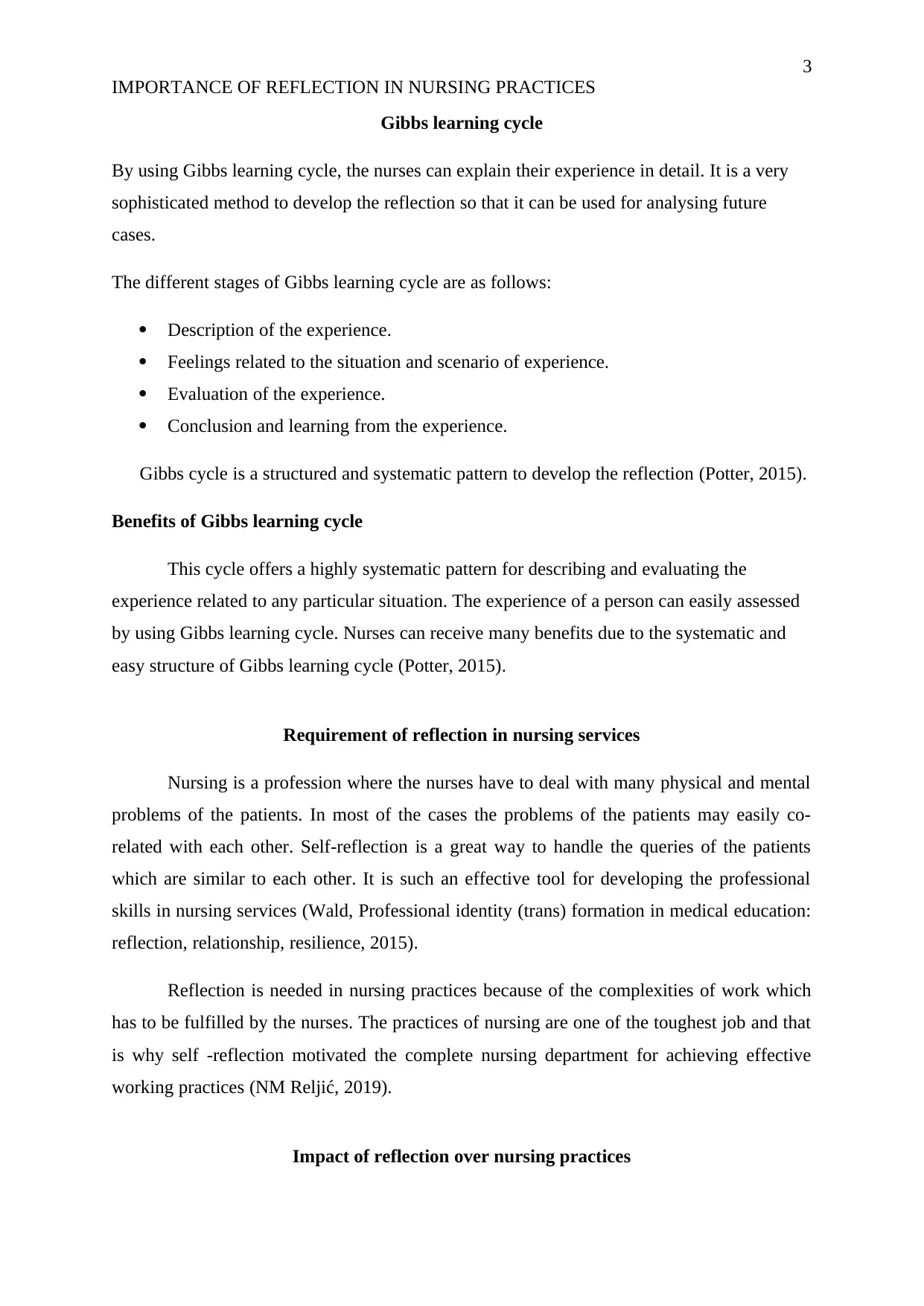
3
IMPORTANCE OF REFLECTION IN NURSING PRACTICES
Gibbs learning cycle
By using Gibbs learning cycle, the nurses can explain their experience in detail. It is a very
sophisticated method to develop the reflection so that it can be used for analysing future
cases.
The different stages of Gibbs learning cycle are as follows:
Description of the experience.
Feelings related to the situation and scenario of experience.
Evaluation of the experience.
Conclusion and learning from the experience.
Gibbs cycle is a structured and systematic pattern to develop the reflection (Potter, 2015).
Benefits of Gibbs learning cycle
This cycle offers a highly systematic pattern for describing and evaluating the
experience related to any particular situation. The experience of a person can easily assessed
by using Gibbs learning cycle. Nurses can receive many benefits due to the systematic and
easy structure of Gibbs learning cycle (Potter, 2015).
Requirement of reflection in nursing services
Nursing is a profession where the nurses have to deal with many physical and mental
problems of the patients. In most of the cases the problems of the patients may easily co-
related with each other. Self-reflection is a great way to handle the queries of the patients
which are similar to each other. It is such an effective tool for developing the professional
skills in nursing services (Wald, Professional identity (trans) formation in medical education:
reflection, relationship, resilience, 2015).
Reflection is needed in nursing practices because of the complexities of work which
has to be fulfilled by the nurses. The practices of nursing are one of the toughest job and that
is why self -reflection motivated the complete nursing department for achieving effective
working practices (NM Reljić, 2019).
Impact of reflection over nursing practices
IMPORTANCE OF REFLECTION IN NURSING PRACTICES
Gibbs learning cycle
By using Gibbs learning cycle, the nurses can explain their experience in detail. It is a very
sophisticated method to develop the reflection so that it can be used for analysing future
cases.
The different stages of Gibbs learning cycle are as follows:
Description of the experience.
Feelings related to the situation and scenario of experience.
Evaluation of the experience.
Conclusion and learning from the experience.
Gibbs cycle is a structured and systematic pattern to develop the reflection (Potter, 2015).
Benefits of Gibbs learning cycle
This cycle offers a highly systematic pattern for describing and evaluating the
experience related to any particular situation. The experience of a person can easily assessed
by using Gibbs learning cycle. Nurses can receive many benefits due to the systematic and
easy structure of Gibbs learning cycle (Potter, 2015).
Requirement of reflection in nursing services
Nursing is a profession where the nurses have to deal with many physical and mental
problems of the patients. In most of the cases the problems of the patients may easily co-
related with each other. Self-reflection is a great way to handle the queries of the patients
which are similar to each other. It is such an effective tool for developing the professional
skills in nursing services (Wald, Professional identity (trans) formation in medical education:
reflection, relationship, resilience, 2015).
Reflection is needed in nursing practices because of the complexities of work which
has to be fulfilled by the nurses. The practices of nursing are one of the toughest job and that
is why self -reflection motivated the complete nursing department for achieving effective
working practices (NM Reljić, 2019).
Impact of reflection over nursing practices
Paraphrase This Document
Need a fresh take? Get an instant paraphrase of this document with our AI Paraphraser
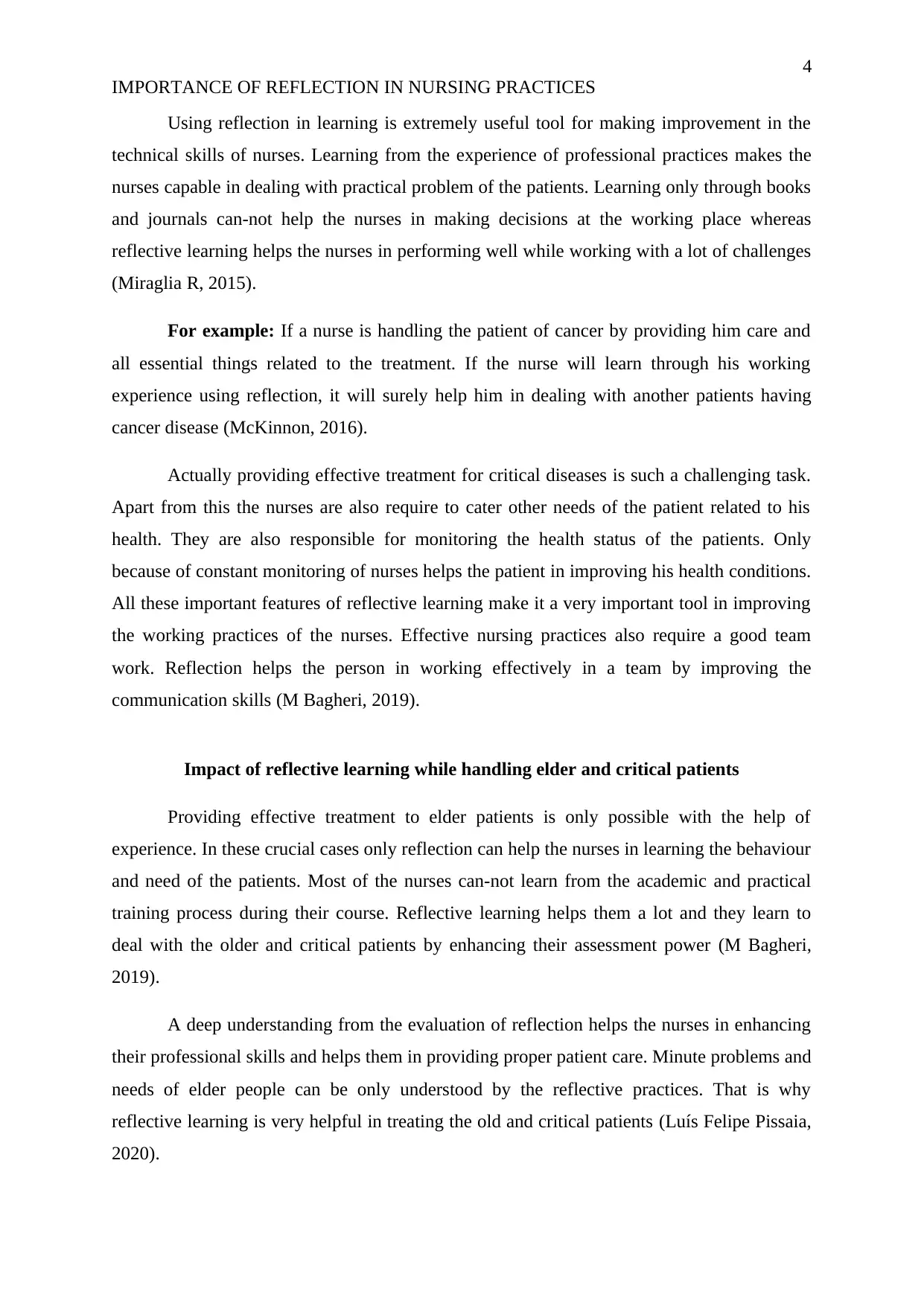
4
IMPORTANCE OF REFLECTION IN NURSING PRACTICES
Using reflection in learning is extremely useful tool for making improvement in the
technical skills of nurses. Learning from the experience of professional practices makes the
nurses capable in dealing with practical problem of the patients. Learning only through books
and journals can-not help the nurses in making decisions at the working place whereas
reflective learning helps the nurses in performing well while working with a lot of challenges
(Miraglia R, 2015).
For example: If a nurse is handling the patient of cancer by providing him care and
all essential things related to the treatment. If the nurse will learn through his working
experience using reflection, it will surely help him in dealing with another patients having
cancer disease (McKinnon, 2016).
Actually providing effective treatment for critical diseases is such a challenging task.
Apart from this the nurses are also require to cater other needs of the patient related to his
health. They are also responsible for monitoring the health status of the patients. Only
because of constant monitoring of nurses helps the patient in improving his health conditions.
All these important features of reflective learning make it a very important tool in improving
the working practices of the nurses. Effective nursing practices also require a good team
work. Reflection helps the person in working effectively in a team by improving the
communication skills (M Bagheri, 2019).
Impact of reflective learning while handling elder and critical patients
Providing effective treatment to elder patients is only possible with the help of
experience. In these crucial cases only reflection can help the nurses in learning the behaviour
and need of the patients. Most of the nurses can-not learn from the academic and practical
training process during their course. Reflective learning helps them a lot and they learn to
deal with the older and critical patients by enhancing their assessment power (M Bagheri,
2019).
A deep understanding from the evaluation of reflection helps the nurses in enhancing
their professional skills and helps them in providing proper patient care. Minute problems and
needs of elder people can be only understood by the reflective practices. That is why
reflective learning is very helpful in treating the old and critical patients (Luís Felipe Pissaia,
2020).
IMPORTANCE OF REFLECTION IN NURSING PRACTICES
Using reflection in learning is extremely useful tool for making improvement in the
technical skills of nurses. Learning from the experience of professional practices makes the
nurses capable in dealing with practical problem of the patients. Learning only through books
and journals can-not help the nurses in making decisions at the working place whereas
reflective learning helps the nurses in performing well while working with a lot of challenges
(Miraglia R, 2015).
For example: If a nurse is handling the patient of cancer by providing him care and
all essential things related to the treatment. If the nurse will learn through his working
experience using reflection, it will surely help him in dealing with another patients having
cancer disease (McKinnon, 2016).
Actually providing effective treatment for critical diseases is such a challenging task.
Apart from this the nurses are also require to cater other needs of the patient related to his
health. They are also responsible for monitoring the health status of the patients. Only
because of constant monitoring of nurses helps the patient in improving his health conditions.
All these important features of reflective learning make it a very important tool in improving
the working practices of the nurses. Effective nursing practices also require a good team
work. Reflection helps the person in working effectively in a team by improving the
communication skills (M Bagheri, 2019).
Impact of reflective learning while handling elder and critical patients
Providing effective treatment to elder patients is only possible with the help of
experience. In these crucial cases only reflection can help the nurses in learning the behaviour
and need of the patients. Most of the nurses can-not learn from the academic and practical
training process during their course. Reflective learning helps them a lot and they learn to
deal with the older and critical patients by enhancing their assessment power (M Bagheri,
2019).
A deep understanding from the evaluation of reflection helps the nurses in enhancing
their professional skills and helps them in providing proper patient care. Minute problems and
needs of elder people can be only understood by the reflective practices. That is why
reflective learning is very helpful in treating the old and critical patients (Luís Felipe Pissaia,
2020).
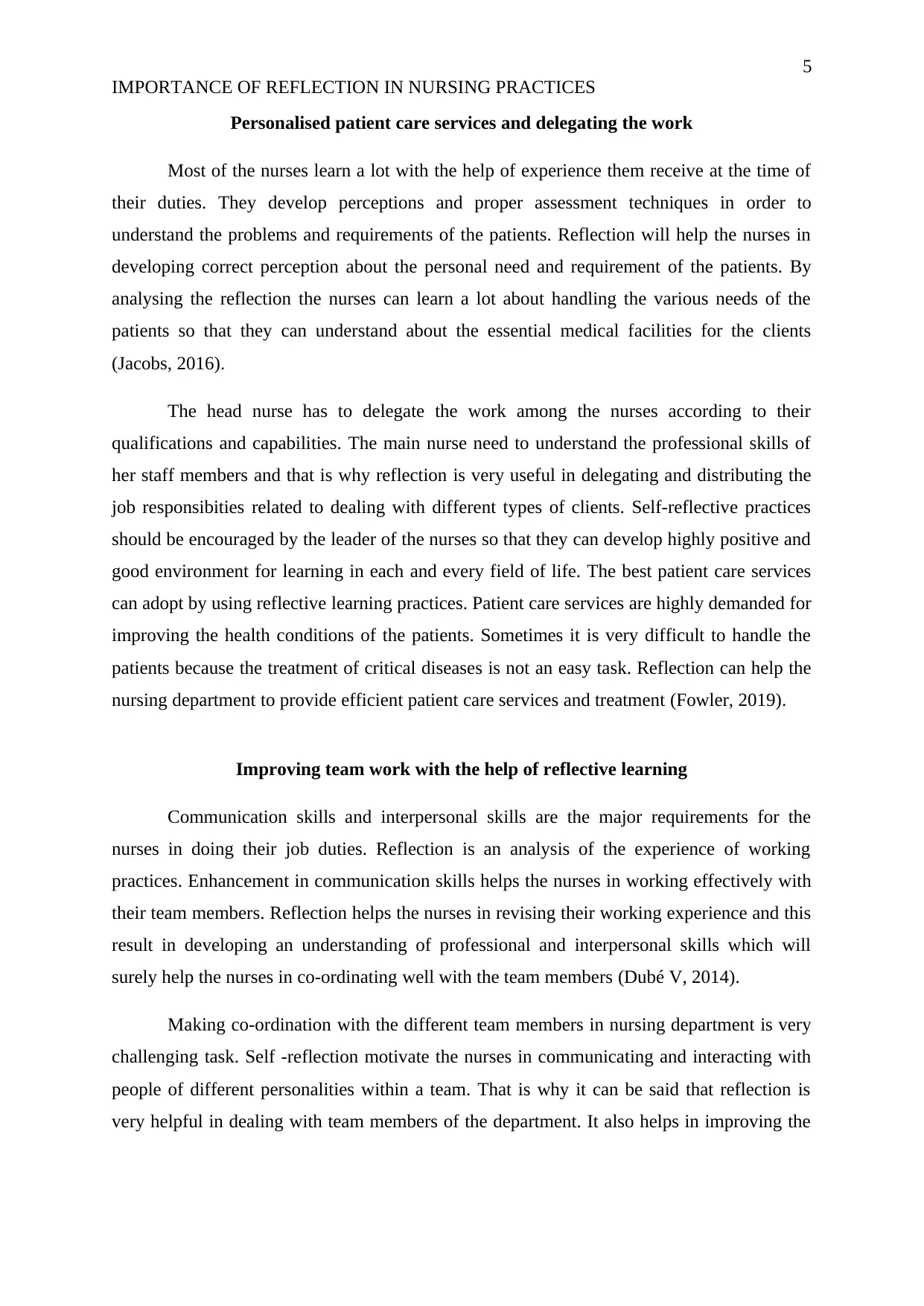
5
IMPORTANCE OF REFLECTION IN NURSING PRACTICES
Personalised patient care services and delegating the work
Most of the nurses learn a lot with the help of experience them receive at the time of
their duties. They develop perceptions and proper assessment techniques in order to
understand the problems and requirements of the patients. Reflection will help the nurses in
developing correct perception about the personal need and requirement of the patients. By
analysing the reflection the nurses can learn a lot about handling the various needs of the
patients so that they can understand about the essential medical facilities for the clients
(Jacobs, 2016).
The head nurse has to delegate the work among the nurses according to their
qualifications and capabilities. The main nurse need to understand the professional skills of
her staff members and that is why reflection is very useful in delegating and distributing the
job responsibities related to dealing with different types of clients. Self-reflective practices
should be encouraged by the leader of the nurses so that they can develop highly positive and
good environment for learning in each and every field of life. The best patient care services
can adopt by using reflective learning practices. Patient care services are highly demanded for
improving the health conditions of the patients. Sometimes it is very difficult to handle the
patients because the treatment of critical diseases is not an easy task. Reflection can help the
nursing department to provide efficient patient care services and treatment (Fowler, 2019).
Improving team work with the help of reflective learning
Communication skills and interpersonal skills are the major requirements for the
nurses in doing their job duties. Reflection is an analysis of the experience of working
practices. Enhancement in communication skills helps the nurses in working effectively with
their team members. Reflection helps the nurses in revising their working experience and this
result in developing an understanding of professional and interpersonal skills which will
surely help the nurses in co-ordinating well with the team members (Dubé V, 2014).
Making co-ordination with the different team members in nursing department is very
challenging task. Self -reflection motivate the nurses in communicating and interacting with
people of different personalities within a team. That is why it can be said that reflection is
very helpful in dealing with team members of the department. It also helps in improving the
IMPORTANCE OF REFLECTION IN NURSING PRACTICES
Personalised patient care services and delegating the work
Most of the nurses learn a lot with the help of experience them receive at the time of
their duties. They develop perceptions and proper assessment techniques in order to
understand the problems and requirements of the patients. Reflection will help the nurses in
developing correct perception about the personal need and requirement of the patients. By
analysing the reflection the nurses can learn a lot about handling the various needs of the
patients so that they can understand about the essential medical facilities for the clients
(Jacobs, 2016).
The head nurse has to delegate the work among the nurses according to their
qualifications and capabilities. The main nurse need to understand the professional skills of
her staff members and that is why reflection is very useful in delegating and distributing the
job responsibities related to dealing with different types of clients. Self-reflective practices
should be encouraged by the leader of the nurses so that they can develop highly positive and
good environment for learning in each and every field of life. The best patient care services
can adopt by using reflective learning practices. Patient care services are highly demanded for
improving the health conditions of the patients. Sometimes it is very difficult to handle the
patients because the treatment of critical diseases is not an easy task. Reflection can help the
nursing department to provide efficient patient care services and treatment (Fowler, 2019).
Improving team work with the help of reflective learning
Communication skills and interpersonal skills are the major requirements for the
nurses in doing their job duties. Reflection is an analysis of the experience of working
practices. Enhancement in communication skills helps the nurses in working effectively with
their team members. Reflection helps the nurses in revising their working experience and this
result in developing an understanding of professional and interpersonal skills which will
surely help the nurses in co-ordinating well with the team members (Dubé V, 2014).
Making co-ordination with the different team members in nursing department is very
challenging task. Self -reflection motivate the nurses in communicating and interacting with
people of different personalities within a team. That is why it can be said that reflection is
very helpful in dealing with team members of the department. It also helps in improving the
⊘ This is a preview!⊘
Do you want full access?
Subscribe today to unlock all pages.

Trusted by 1+ million students worldwide
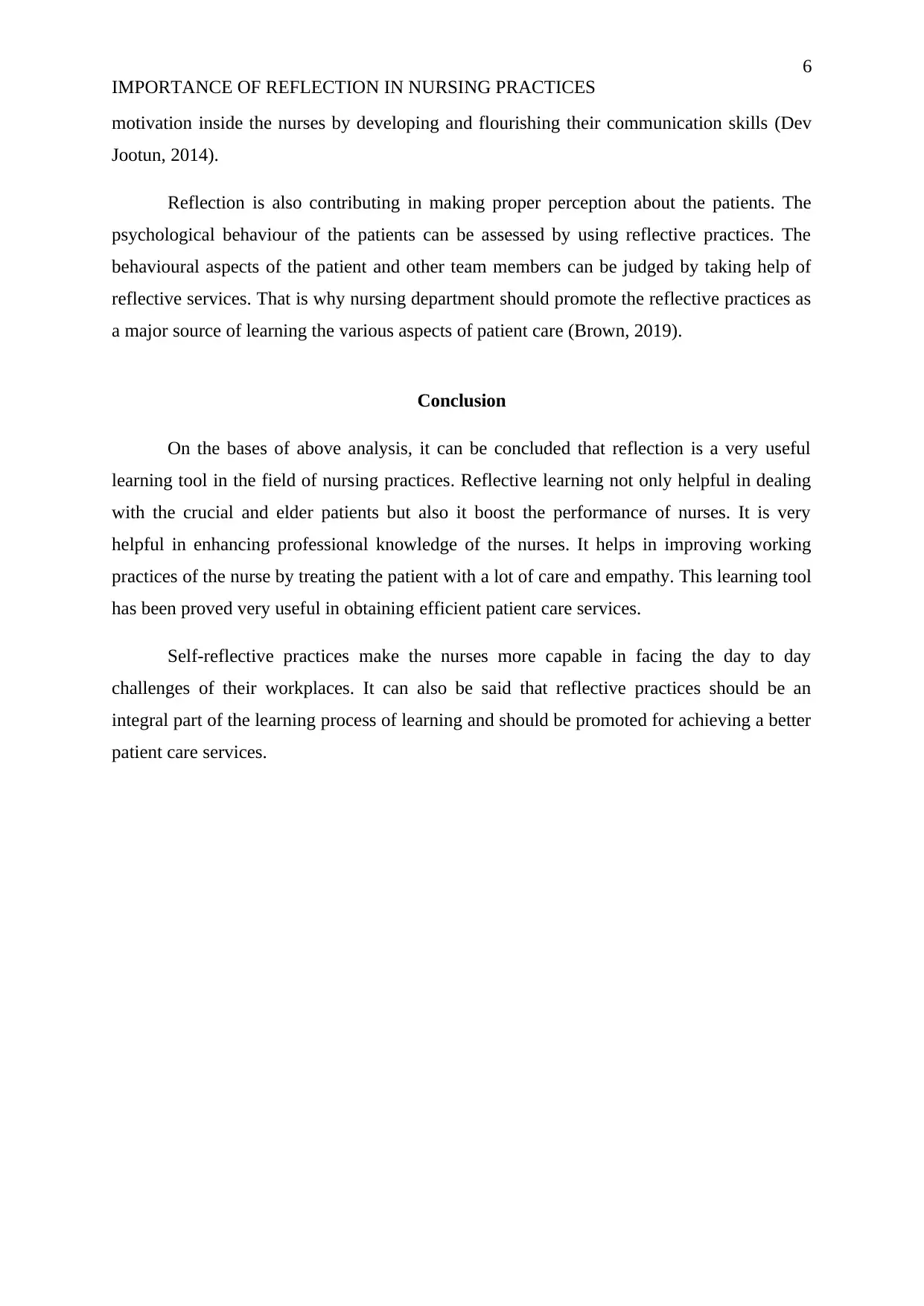
6
IMPORTANCE OF REFLECTION IN NURSING PRACTICES
motivation inside the nurses by developing and flourishing their communication skills (Dev
Jootun, 2014).
Reflection is also contributing in making proper perception about the patients. The
psychological behaviour of the patients can be assessed by using reflective practices. The
behavioural aspects of the patient and other team members can be judged by taking help of
reflective services. That is why nursing department should promote the reflective practices as
a major source of learning the various aspects of patient care (Brown, 2019).
Conclusion
On the bases of above analysis, it can be concluded that reflection is a very useful
learning tool in the field of nursing practices. Reflective learning not only helpful in dealing
with the crucial and elder patients but also it boost the performance of nurses. It is very
helpful in enhancing professional knowledge of the nurses. It helps in improving working
practices of the nurse by treating the patient with a lot of care and empathy. This learning tool
has been proved very useful in obtaining efficient patient care services.
Self-reflective practices make the nurses more capable in facing the day to day
challenges of their workplaces. It can also be said that reflective practices should be an
integral part of the learning process of learning and should be promoted for achieving a better
patient care services.
IMPORTANCE OF REFLECTION IN NURSING PRACTICES
motivation inside the nurses by developing and flourishing their communication skills (Dev
Jootun, 2014).
Reflection is also contributing in making proper perception about the patients. The
psychological behaviour of the patients can be assessed by using reflective practices. The
behavioural aspects of the patient and other team members can be judged by taking help of
reflective services. That is why nursing department should promote the reflective practices as
a major source of learning the various aspects of patient care (Brown, 2019).
Conclusion
On the bases of above analysis, it can be concluded that reflection is a very useful
learning tool in the field of nursing practices. Reflective learning not only helpful in dealing
with the crucial and elder patients but also it boost the performance of nurses. It is very
helpful in enhancing professional knowledge of the nurses. It helps in improving working
practices of the nurse by treating the patient with a lot of care and empathy. This learning tool
has been proved very useful in obtaining efficient patient care services.
Self-reflective practices make the nurses more capable in facing the day to day
challenges of their workplaces. It can also be said that reflective practices should be an
integral part of the learning process of learning and should be promoted for achieving a better
patient care services.
Paraphrase This Document
Need a fresh take? Get an instant paraphrase of this document with our AI Paraphraser
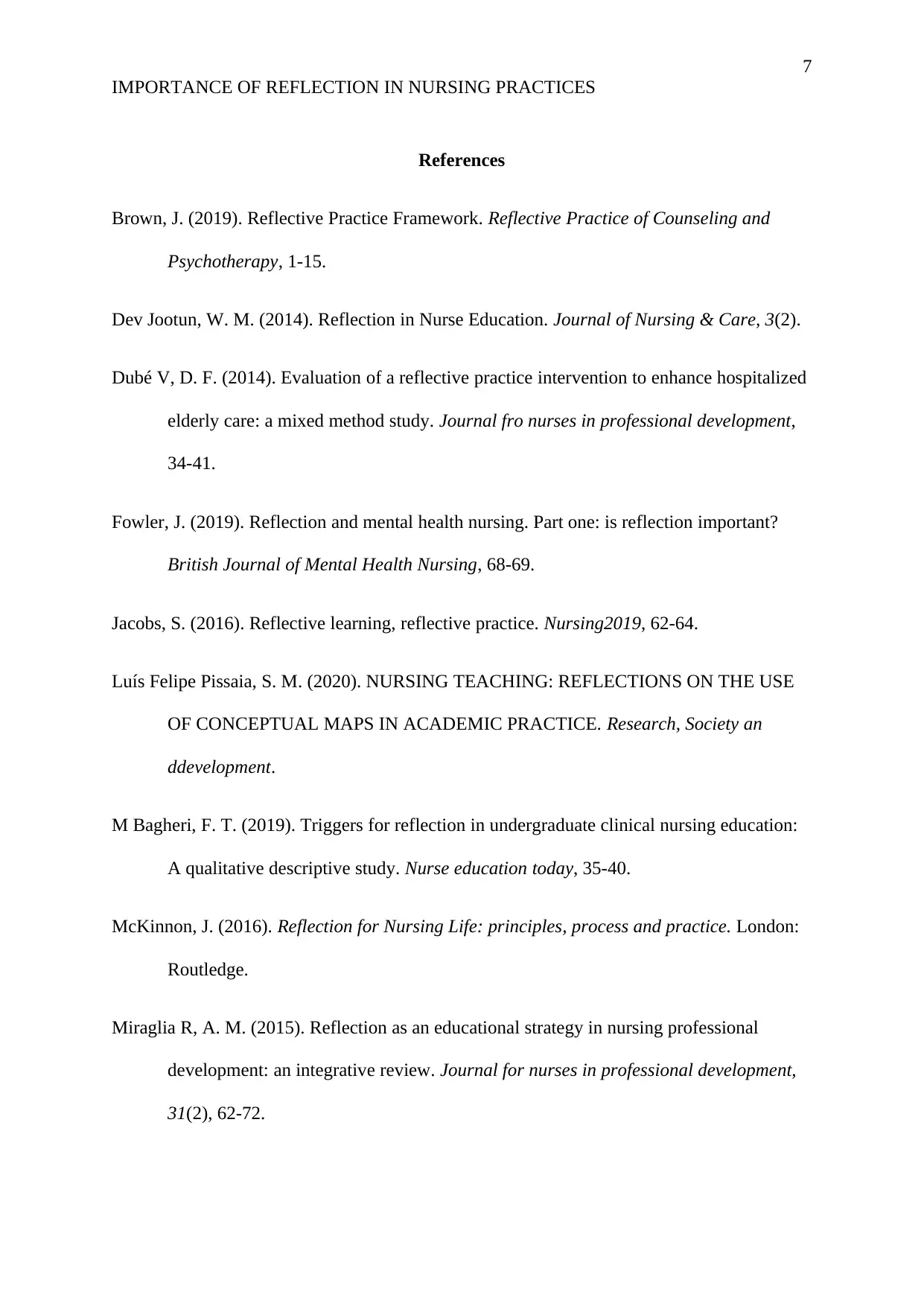
7
IMPORTANCE OF REFLECTION IN NURSING PRACTICES
References
Brown, J. (2019). Reflective Practice Framework. Reflective Practice of Counseling and
Psychotherapy, 1-15.
Dev Jootun, W. M. (2014). Reflection in Nurse Education. Journal of Nursing & Care, 3(2).
Dubé V, D. F. (2014). Evaluation of a reflective practice intervention to enhance hospitalized
elderly care: a mixed method study. Journal fro nurses in professional development,
34-41.
Fowler, J. (2019). Reflection and mental health nursing. Part one: is reflection important?
British Journal of Mental Health Nursing, 68-69.
Jacobs, S. (2016). Reflective learning, reflective practice. Nursing2019, 62-64.
Luís Felipe Pissaia, S. M. (2020). NURSING TEACHING: REFLECTIONS ON THE USE
OF CONCEPTUAL MAPS IN ACADEMIC PRACTICE. Research, Society an
ddevelopment.
M Bagheri, F. T. (2019). Triggers for reflection in undergraduate clinical nursing education:
A qualitative descriptive study. Nurse education today, 35-40.
McKinnon, J. (2016). Reflection for Nursing Life: principles, process and practice. London:
Routledge.
Miraglia R, A. M. (2015). Reflection as an educational strategy in nursing professional
development: an integrative review. Journal for nurses in professional development,
31(2), 62-72.
IMPORTANCE OF REFLECTION IN NURSING PRACTICES
References
Brown, J. (2019). Reflective Practice Framework. Reflective Practice of Counseling and
Psychotherapy, 1-15.
Dev Jootun, W. M. (2014). Reflection in Nurse Education. Journal of Nursing & Care, 3(2).
Dubé V, D. F. (2014). Evaluation of a reflective practice intervention to enhance hospitalized
elderly care: a mixed method study. Journal fro nurses in professional development,
34-41.
Fowler, J. (2019). Reflection and mental health nursing. Part one: is reflection important?
British Journal of Mental Health Nursing, 68-69.
Jacobs, S. (2016). Reflective learning, reflective practice. Nursing2019, 62-64.
Luís Felipe Pissaia, S. M. (2020). NURSING TEACHING: REFLECTIONS ON THE USE
OF CONCEPTUAL MAPS IN ACADEMIC PRACTICE. Research, Society an
ddevelopment.
M Bagheri, F. T. (2019). Triggers for reflection in undergraduate clinical nursing education:
A qualitative descriptive study. Nurse education today, 35-40.
McKinnon, J. (2016). Reflection for Nursing Life: principles, process and practice. London:
Routledge.
Miraglia R, A. M. (2015). Reflection as an educational strategy in nursing professional
development: an integrative review. Journal for nurses in professional development,
31(2), 62-72.
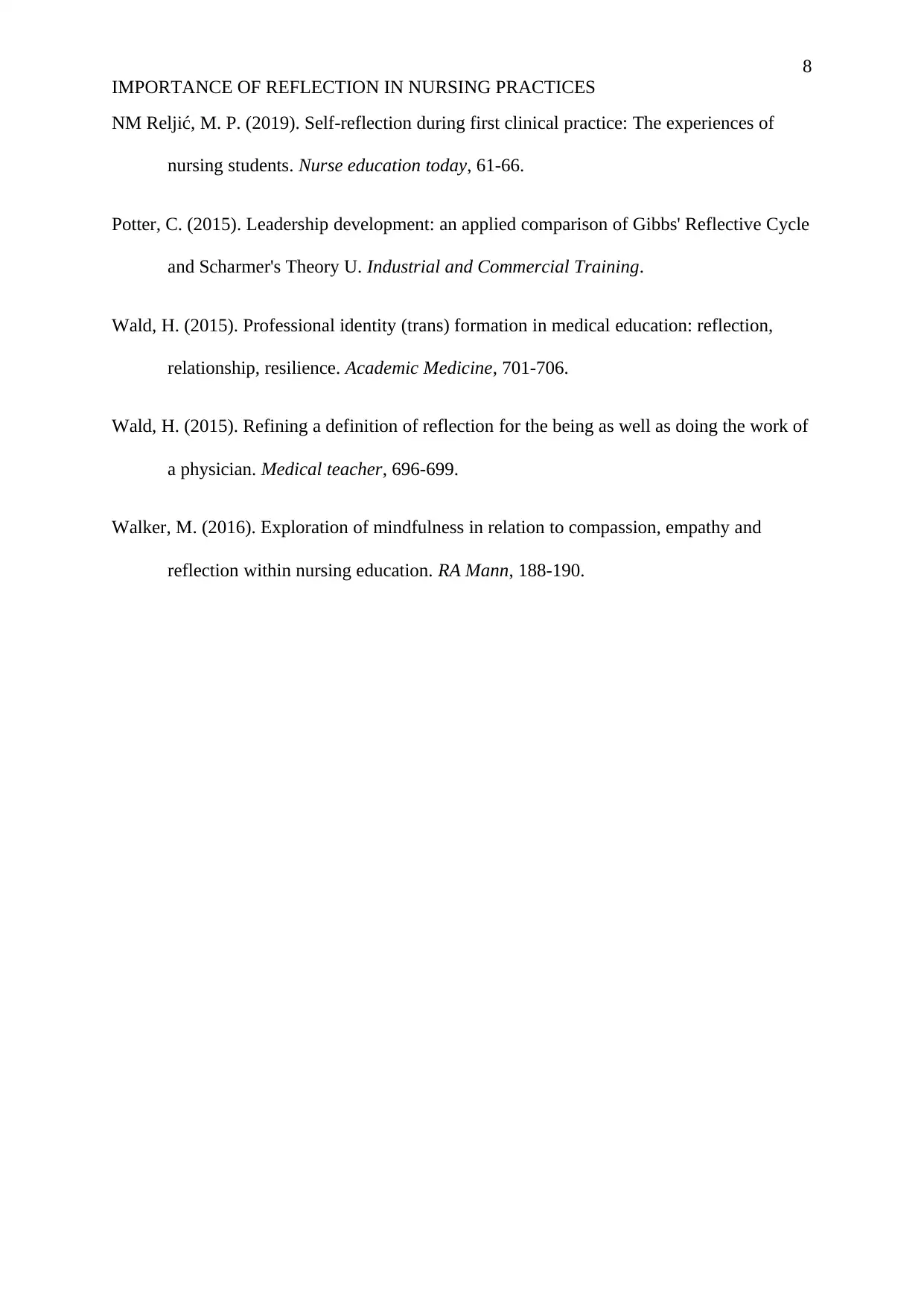
8
IMPORTANCE OF REFLECTION IN NURSING PRACTICES
NM Reljić, M. P. (2019). Self-reflection during first clinical practice: The experiences of
nursing students. Nurse education today, 61-66.
Potter, C. (2015). Leadership development: an applied comparison of Gibbs' Reflective Cycle
and Scharmer's Theory U. Industrial and Commercial Training.
Wald, H. (2015). Professional identity (trans) formation in medical education: reflection,
relationship, resilience. Academic Medicine, 701-706.
Wald, H. (2015). Refining a definition of reflection for the being as well as doing the work of
a physician. Medical teacher, 696-699.
Walker, M. (2016). Exploration of mindfulness in relation to compassion, empathy and
reflection within nursing education. RA Mann, 188-190.
IMPORTANCE OF REFLECTION IN NURSING PRACTICES
NM Reljić, M. P. (2019). Self-reflection during first clinical practice: The experiences of
nursing students. Nurse education today, 61-66.
Potter, C. (2015). Leadership development: an applied comparison of Gibbs' Reflective Cycle
and Scharmer's Theory U. Industrial and Commercial Training.
Wald, H. (2015). Professional identity (trans) formation in medical education: reflection,
relationship, resilience. Academic Medicine, 701-706.
Wald, H. (2015). Refining a definition of reflection for the being as well as doing the work of
a physician. Medical teacher, 696-699.
Walker, M. (2016). Exploration of mindfulness in relation to compassion, empathy and
reflection within nursing education. RA Mann, 188-190.
⊘ This is a preview!⊘
Do you want full access?
Subscribe today to unlock all pages.

Trusted by 1+ million students worldwide
1 out of 9
Related Documents
Your All-in-One AI-Powered Toolkit for Academic Success.
+13062052269
info@desklib.com
Available 24*7 on WhatsApp / Email
![[object Object]](/_next/static/media/star-bottom.7253800d.svg)
Unlock your academic potential
Copyright © 2020–2026 A2Z Services. All Rights Reserved. Developed and managed by ZUCOL.





